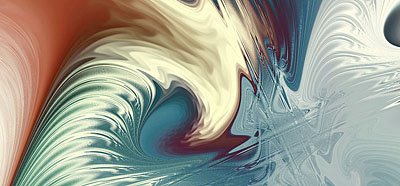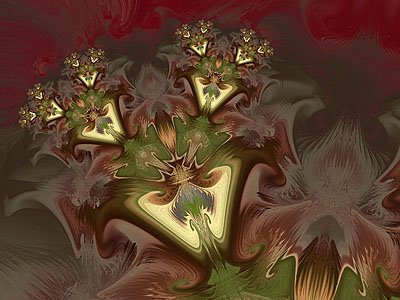Retrospective (Part Two) - An Affair With Popcorn

I've gotten a lot of use out of Popcorn and derivative formulas. It seems very expressive, although one has to wonder whether simulated expression has any meaning. At first I just used it as a base on which to run various coloring algorithms, but after studying the work of Paul Carlson I had an idea: why not use Popcorn itself as an orbit trap?

The next step had to wait until I understood Ultra Fractal transforms, and when I did, of course, I had to use Popcorn as the basis for one. The image below stirred up dim memories of looking through my mother's art books when I was young. I gave it its name without really consciously knowing what it referred to.

The rediscovery of Max Ernst and the fractal nature of much of his work (which I've talked about in a previous post) led me to emulate - but hopefully not simply imitate - his work. The addition of background skies to my "gnarlscapes" required the writing of complicated masking transforms which ran Julia sets with orbit traps distorted by Popcorn (jobs usually covered by the different formula types in Ultra Fractal)

Eventually I felt I was just repeating myself and had to move on. Popcorn appeared again as another orbit trap, this time with fBm mapped on to the elements. Mapping textures on to the elements of orbit traps was something that I'd experimented way back in the original Popcorn Orbit Trap (which has a "Martin" coloring mode), but fBm was much more useful. Damien Jones supplied the fBm code (which was something of a tour de force of Ultra Fractal programming at the time)

Apophysis kept me occupied for a couple of years, and with that I was really just adding a GUI to things that other people had already done. Eventually I felt confident enough to add my own variation (although Scott Draves did "fix" it). I hadn't forgotten Popcorn.

Sometimes I wonder if Popcorn has become a cliche (or perhaps, to put it in a better light, one of Kerry's "standards"). It can simulate expression, but what does that matter when it is the same expression over and over again? However, since it inspired much of my best work I don't think I'll ever be able to give it up entirely.





1 Comments:
I'll be interested in seeing gnarly vases.
I should have stated in the main article that the Popcorn formula comes from...
Clifford Pickover
One of giants of fractal art (think "epsilon cross"). The term "giant" of course, refers to those mythical beings who existed before we poor mortals came into being.
The terms "Vine" and "Gnarl" for Popcorn derivative formulas came from...
Rudy Rucker
He also happens to be one of my favourite science fiction authors.
10/10/2006 8:18 AM
Post a Comment
<< Home